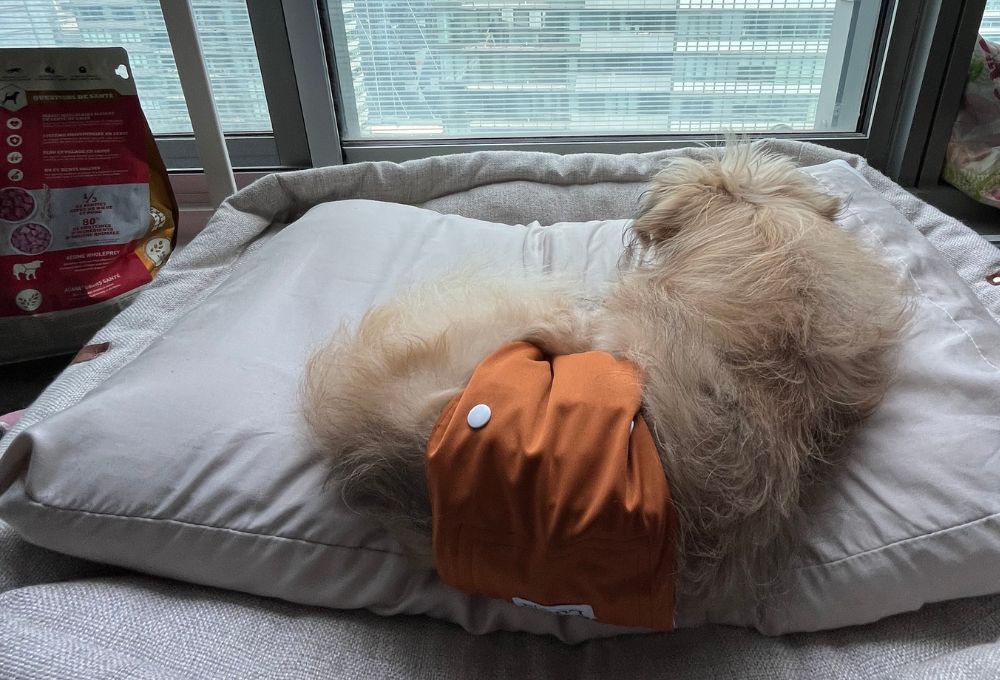Are you dealing with a senior dog peeing in the house? There’s no need to be frustrated! There could be many reasons why this is happening and it’s important to approach the issue with patience, understanding, and effective strategies.
A 15-year-old dog (one of my regular customers) pees inside the house even when providing regular bathroom breaks. I think is just because he likes to mark, and of course, my apartment is also his. But this is actually not an issue at all. He wears a doggy diaper indoors and seems to be super comfy. I just regularly check when it is time for a change to prevent any discomfort or urinary infections.

This article aims to provide guidance on how to stop your senior dog from peeing in the house, ensuring a clean and comfortable living environment for both you and your furry friend.
- 1. Understanding the Reasons Behind the Behavior
- 2. Create a Consistent Routine
- 3. Frequent Bathroom Breaks
- 4. Provide Easy Access to the Outdoors
- 5. Manage Your Senior Dog’s Diet
- 6. Proper Hydration
- 7. Monitor Health Conditions
- 8. Positive Reinforcement and Reward System
- 9. Dog Diapers
- 10. Seek Professional Help
- Conclusion
- Frequently Asked Questions (FAQs)
1. Understanding the Reasons Behind the Behavior
Some common causes include:
- Reduced bladder control
- Urinary tract infections
- Anxiety or stress
- Changes in routine or environment
- Cognitive decline or doggie dementia
2. Create a Consistent Routine
Designate specific times for feeding, bathroom breaks, naps, and playtime. Dogs thrive on routine, and a well-structured schedule can help minimize accidents indoors.
3. Frequent Bathroom Breaks
Senior dogs have reduced bladder control, so they may need more frequent bathroom breaks. Take your dog outside every few hours, especially after meals or naps. Reward them with praise or treats for peeing in the appropriate spot.
4. Provide Easy Access to the Outdoors
If you have a yard, ensure that your senior dog has easy access to the outdoors. Install a doggy door or keep the door open to allow them to go outside whenever they need to relieve themselves. Always keep an eye on them when they are outside to prevent any accidents.
5. Manage Your Senior Dog’s Diet
Optimize your senior dog’s diet for bladder health and regular bowel movements. Consult your veterinarian to determine the best diet for your dog’s specific needs.
6. Proper Hydration
Monitor your senior dog’s water intake to ensure they are adequately hydrated without overdrinking. Provide fresh water throughout the day and limit water intake before bedtime.
7. Monitor Health Conditions
Regularly monitor your senior dog’s health and promptly address any underlying medical conditions. Conditions like urinary tract infections, bladder stones, or diabetes can contribute to peeing inside the house.
8. Positive Reinforcement and Reward System
When your senior dog pees outside, praise them enthusiastically and offer treats as rewards. This positive association encourages them to repeat the desired behavior and helps prevent accidents inside the house.
9. Dog Diapers
As I mentioned before, the solution could be dog diapers. There are disposable options that are convenient but more expensive in the long run and create waste. There are also reusable options that are cost-effective and you can toast them in the washing machine. They come in different colors making them a fashion accessory. However, be aware that your dog will require some time to get used to the diaper.
10. Seek Professional Help
Consult with a professional dog trainer or animal behaviorist. They can assess the situation, identify any underlying behavioral issues, and provide specialized guidance tailored to your dog’s specific needs.
Conclusion
Dealing with a senior dog that pees in the house requires patience, understanding, and a proactive approach. Create a consistent routine, and address any underlying health issues to effectively reduce or eliminate house-soiling behavior. Remember to reinforce positive behavior, seek professional help if needed, and provide your senior dog with the love and care they deserve.
Frequently Asked Questions (FAQs)
Yes, certain medical conditions like urinary tract infections, bladder stones, or diabetes can contribute to this behavior. It’s essential to monitor your dog’s health regularly.
Yes, dog diapers can be a practical solution for managing senior dogs’ house-soiling behavior. They provide comfort and prevent accidents indoors.
Senior dogs may need more frequent bathroom breaks due to reduced bladder control. Take them outside every few hours, especially after meals or naps.
Recent Posts:
- My Dog Loves His New Cooling Mat
- Is the Dogo App Worth It? Honest Review After Training My Dog
- Amazon’s Top Black Friday and Cyber Monday Deals for 2024: Dog Products Edition
- Top Pet Trackers for Sending Your Dog with a Pet Sitter
- Should Dogs Wear Bells?
Recent Posts
This summer, the temperatures are getting extremely high, and as you may know, dogs don’t sweat like humans to regulate their body temperatures. They mostly use their paws and breathing to cool...
Is the Dogo App Worth It? Honest Review After Training My Dog
Training your dog shouldn’t feel like another chore, but it often does because, unless you’re a professional trainer, you have to research everything yourself first. And that research can take...
